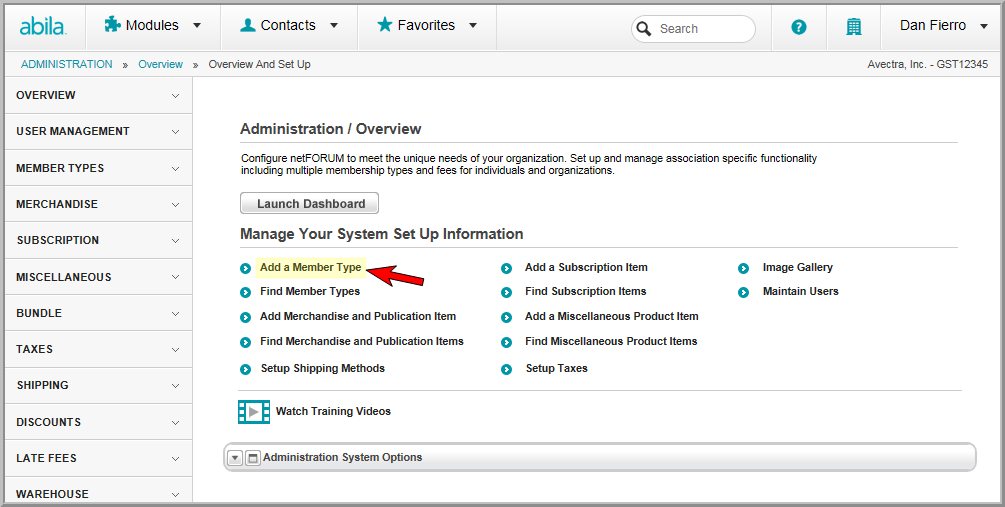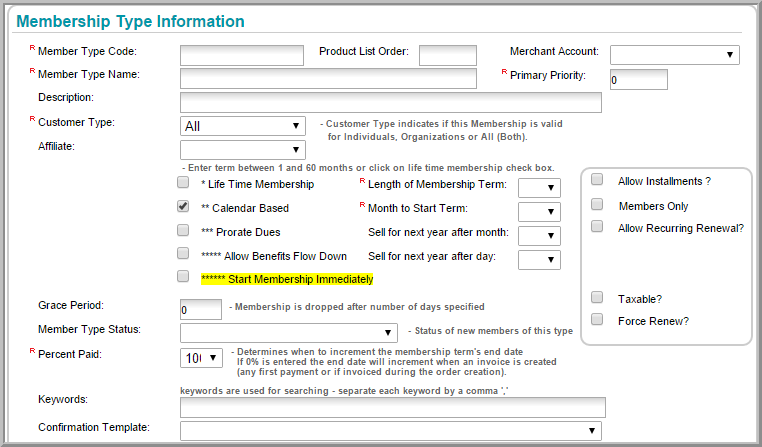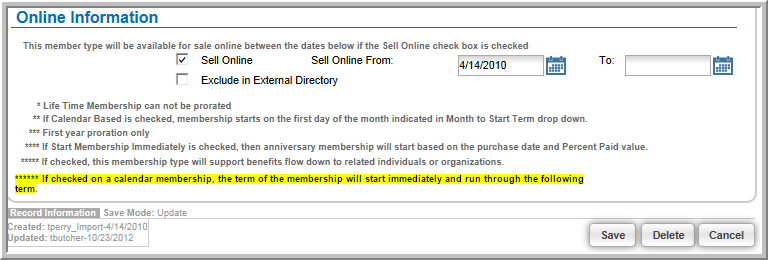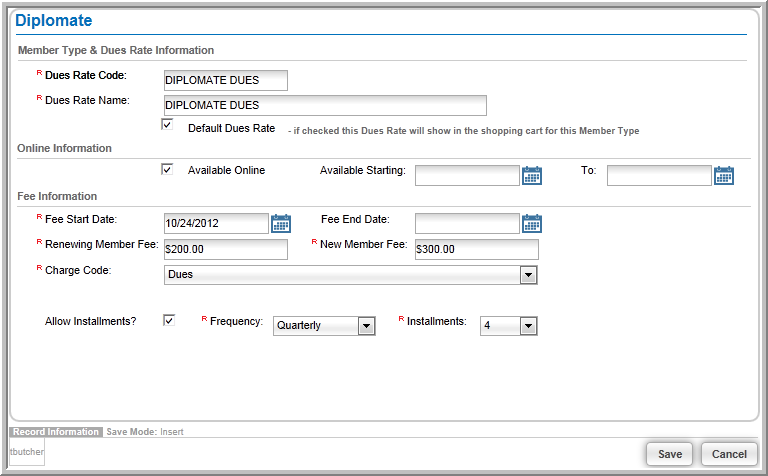Open topic with navigation
Setting Up a Calendar-Based Membership
A Calendar-Based Membership
is a membership that starts on a specified month and day (e.g., January
1st) and expires on a set number of months later (e.g., 12 months later).
The membership start and end dates are determined by the numbers entered
in the Month to Start Term and
Length of Membership Term fields
when you set up the Member Type.
For example, for a 1-year membership that starts on January 1st, you would
enter 1 for Month
to Start Term and 12 for
Length of Membership Term.
If you want to prorate the dues so that a customer can purchase a membership
any time during the year and not have to pay the full membership fee,
select the Prorate Dues check
box. The dues will be based on the number of months left in the membership
term. For example, if the customer purchases the membership in June, they
will only have to pay 50 percent of the original cost of the dues.
To set up
a Calendar-Based Membership:
- Hover over the Modules tab in the top navigation bar. In the fly out menu, click Administration.
- On the Administration /
Overview page, click Add a Member Type.

- In the Membership
Type Information section (seen below), enter the Member
Type Code and
Product List Order.
- Enter the Member
Type Name (name of the membership).
- Enter the Primary
Priority of the membership if your entity allows multiple memberships.
This is required. View Setting
Up Multiple Memberships for more information.
- Enter a Description
for the membership.
- From the Customer
Type drop-down list:
- Select Individual
to specify that the membership is only for individuals.
- Select Organization
to specify that the membership is only for organizations.
- Select All
to specify that the membership is for both individuals and organizations.
- Select an Affiliate
from the drop-down menu. The Affiliates
module may be used to define those chapters, special interest groups,
sections and so forth affiliated with a member type, committee, event,
etc. An affiliate group may be thought of as a more permanent
data grouping with its own Website and resources than just a member
type or event group. For more information, view What
is the Affiliates Module.
- Select the Calendar-Based
check box.
- To set up the Sell
for Next Year functionality, select the month that customers
can begin to purchase this member type for the next calendar year
in the Sell for next year after month
field. Select the day of the month that customers can begin to purchase
this member type for the next calendar year in the Sell
for next year after day field. For example, in the image
below, memberships will begin selling for the next calendar year after
November 15th.
- Select the Length
of Membership Term (e.g., 12 months).
- Select the month you want the membership to begin
from the Month to Start Term
drop-down list.
- If you want to prorate the dues so that a customer
can purchase a membership any time during the year and not have to
pay the full membership fee, select the Prorate
Dues check box. The system will automatically calculate the
amount due based on the number of months left in the membership.
- If you select the Allow
Benefits Flow Down check box, the membership benefits that
are set up for this membership type will also be available to linked
organizations or individuals.
- If you select the Start Membership Immediately check box, the term of the membership will start immediately and run through the following term.
- The Members Only
check box is selected if only members may purchase this calendar membership.
- The Allow Recurring
Renewal check box is selected if this member type may be renewed
by customers on a recurring payment basis. It is only present
if recurring renewal memberships have been set up for your entity
by Abila support. View Recurring
Renewal Membership Rules for more information.
- Select View By
Non-Members if you want the member type to be viewable by non-members.
This check box is only visible if the Members
Only check box is selected.
- In the Grace
Period field, enter the number of days the member has to
renew the membership after it expires. For example, if the membership
expires on 12/1/12 and the membership drop process is run on 12/15/13,
even though the membership has technically expired, the member won't
be dropped because they still have a grace period in which to pay.
If the member has not paid as of January 1, when the January
drop process is run, the member will be dropped, because the grace
period is over.
- Select the Member
Type Status that will be assigned when this member type is
purchased or renewed (e.g., Active, or Pending). (You might want to
use Pending for the status
if the customer needs to meet certain criteria before membership becomes
active.)
- If you want to base membership activation on payment
amount, you can set up a Percent
Paid requirement. For example, if Payment
in Full is a requirement for membership, select 100
as the Percent Paid requirement.
If only half the payment is required up front, select 50
for the Percent Paid amount.
If the customer is not required to make a payment in order to become
a member, select 0 for the
Percent Paid requirement.
If 0 Percent Paid is entered,
the end date will increment on any (first) payment.
- Enter Keywords
if you want to be able to search for this membership online based
on a keyword. (Separate the keywords with a comma.)
- Use the Confirmation
Template drop-down to specify which template that will be used
to send a confirmation of purchase to customers who purchase this
calendar membership from the online store.

- In the Membership
Type Availability for Sale section (seen below), enter the
Availability for Sale dates.
This is the time period the membership will be available for sale
in the internal Shopping Cart.
- The Member Type
Available From and To dates specify when the Member Type is
available for sale both internally and in the online store.
- The Show as New
From and To dates specify the dates that the Member Type will be featured
as new in the online store.
- The Featured Product
From and To dates specify the dates that the Member Type will be available
in the featured product bar at the top of the online store.
Note: If you select
the Inactive check box,
the membership will not be available for sale internally or in
the online store. It is completely inactive. This
is useful if you need to amend or make changes to the member type
and need to ensure it is not available for purchase in the meantime.

- In the Online Information
section (seen below), select the Sell
Online check box to sell the membership on your Web site. To
set the specific time period for the membership to be available through
the Online Store, enter the
Sell Online start and end
dates.
- Select the Exclude
in External Directory to exclude the membership in the external
find directory.
- Click Save
to create the Member Type Profile.

To add the
Dues Rate:
- .
- Click the Add Dues
Fees button (or, on the Membership Dues Rate child form, click
Add.)
- In the Member Type
& Dues Rate Information window, enter the Dues
Rate Code.
- Enter the Dues
Rate Name.
- Click the Default
Dues Rate check box if this is the default
dues rate.
- Click the Available
Online check box if the membership is to be sold in the Online
Store.
- Enter the Member
Fees. Renewing Member
Fee is what the member will be charged for a membership renewal.
New Member Fee is the
price of a new membership.
- Select the Charge
Code.
- The Allow Installments
check box is visible if installment
billing is available for your entity. It enables customers
to pay off the membership price in the installments you specify in
the Frequency and Installments drop-down such as by
quarters.
- Click Save.

On the Individual or Organization
Profile, in the Membership Information
section, you will see that the membership starts on the first day of the
month selected in Month to Start Term
field. If you make the membership available for sale on 01/01/12 and select
12 for the Length
of Membership Term, the membership Join
Date and Effective Date
will always be 01/01/2012. The Expire
date will always be based on the Month
to Start Term, plus Length of
Membership Term.
For example, if the Month
to Start Term Date is 1
and the membership term is 12
months, the Expire
Date will be 12/31/2012.





